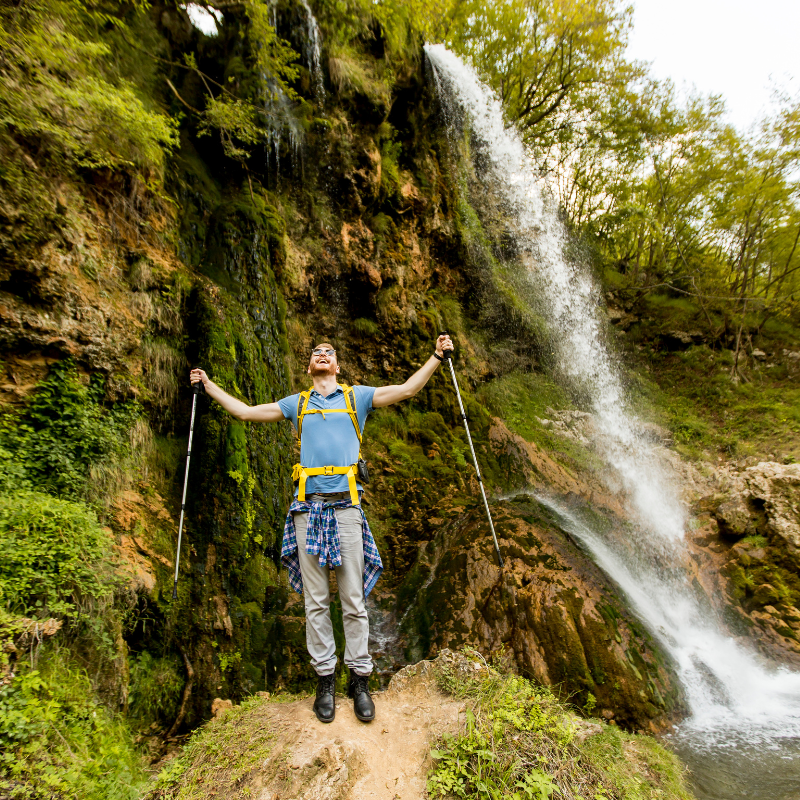The world has become more connected, encouraging people to explore different cultures and natural landscapes.
Traveling broadens horizons, provides invaluable learning experiences, and creates lasting memories.
However, this global movement comes with its challenges. Tourism, especially in its traditional form, often disrupts ecosystems and contributes to environmental degradation.
Eco-tourism offers a responsible alternative. It promotes mindful travel that prioritizes sustainability, benefits local communities, and contributes to nature preservation.
By choosing eco-tourism, travelers can experience the world’s beauty while protecting it for future generations.
What Is Eco-Tourism?

Eco-tourism is a sustainable way of traveling that emphasizes minimizing environmental impact and promoting the well-being of local communities and wildlife.
Unlike mass tourism, eco-tourism encourages travelers to engage positively with their destinations by supporting local businesses, conserving resources, and respecting the environment.
For example, eco-tourists might stay in accommodations powered by renewable energy, dine at family-owned restaurants, or choose guided tours contributing to conservation projects.
These practices not only reduce travel’s carbon footprint but also align with the broader goal of nature preservation.
Why Eco-Tourism Is Important
Eco-tourism addresses the need to balance exploration with environmental responsibility.
Traditional tourism contributes nearly 8% of global carbon emissions, with significant impacts from air travel, accommodations, and food production.
However, tourism also plays a vital role in supporting local economies, particularly in regions where livelihoods depend on visitors.
By practicing eco-tourism, travelers can enjoy their adventures while ensuring their actions promote sustainability.
This approach helps preserve natural landscapes, protects biodiversity, and fosters economic growth in local communities.
Most importantly, it shows how travel can support environmental protection rather than cause harm.
How Eco-Tourism Supports Nature Preservation
Eco-tourism starts with informed planning and conscious decision-making. To ensure your travel aligns with sustainability, consider these practices:
Protecting Natural Resources
Eco-tourism conserves natural resources by encouraging water recycling, renewable energy use, and waste reduction. Travelers who adopt these habits during their trips contribute to the long-term health of ecosystems.
For instance, visiting wildlife sanctuaries or national parks directly supports conservation efforts.
The funds generated from entrance fees often go toward habitat restoration, anti-poaching programs, and environmental education.
These efforts ensure that the natural resources essential for biodiversity remain protected, aligning with the mission of nature preservation.
Encouraging Sustainable Practices
One of eco-tourism’s key goals is to educate travelers about the importance of sustainability. Visitors learn to minimize waste, avoid single-use plastics, and respect the local flora and fauna.
These lessons often extend beyond the trip, influencing daily habits and fostering a global culture of environmental responsibility.
Practical Ways To Practice Ecotourism
Eco-tourism starts with informed planning and conscious decision-making. To ensure your travel aligns with sustainability, consider these practices:
Research Destinations Carefully
- Choose locations prioritizing sustainability, such as green energy, waste management, and eco-friendly transportation.
- Look for accommodations with certifications like LEED or Green Globe to ensure your stay supports environmental goals.
- Explore activities that contribute to conservation, such as volunteering at local projects or visiting wildlife refuges.
Choose Green Transportation
- Use public transit, biking, or walking to explore your destination with minimal environmental impact.
- Opt for trains and buses for longer distances as eco-friendly alternatives to flying.
- If renting a car, choose hybrid or electric models to reduce emissions further.
Support Local Businesses
- Dine at locally owned restaurants to enjoy authentic cuisine while supporting the local economy.
- Shop at community markets for unique, locally crafted products.
- Stay in family-run accommodations, which often have a smaller environmental footprint than large chains.
- Engage with local businesses to immerse yourself in the culture and contribute to sustainable development.
The Positive Impact Of Ecotourism
Eco-tourism benefits local communities and wildlife. It creates a harmonious relationship between travelers and their destinations by reinvesting tourism revenue in preservation efforts.
Economic Empowerment
Eco-tourism creates jobs and fosters entrepreneurship in local communities. The economic benefits are significant, from employing guides and artisans to funding infrastructure projects. This financial stability often improves education, healthcare, and community development.
Wildlife Conservation
Eco-tourism generates essential funds for wildlife conservation programs, including habitat restoration, breeding initiatives for endangered species, and anti-poaching efforts.
Responsible tourism also reduces illegal activities by providing alternative income sources for residents.
These efforts highlight how eco-tourism contributes to nature preservation, ensuring that wildlife and natural habitats thrive.
Challenges Of Ecotourism
Despite its advantages, eco-tourism comes with challenges. Overtourism, for example, can strain local resources and disrupt ecosystems.
Even well-meaning travelers can inadvertently harm the environments they aim to protect without proper regulation.
Cultural displacement is another risk. Communities may feel pressured to commercialize traditions for tourists, leading to a loss of authenticity.
To address these challenges, eco-tourism operators must enforce strict guidelines, educate visitors, and collaborate with local stakeholders. Travelers, too, must respect local customs and practice sustainable habits.
When managed carefully, eco-tourism can overcome these challenges and remain a powerful tool for environmental conservation.
Eco-Tourism As A Path To Nature Preservation

Eco-tourism embodies the principles of sustainable travel, bridging the gap between exploration and conservation. Prioritizing environmental protection, cultural respect, and economic empowerment ensures that tourism benefits people and the planet.
Through small yet meaningful actions—like choosing green transportation, supporting local businesses, and visiting wildlife refuges responsibly—travelers can contribute to the larger goal of preserving nature.
Conclusion
Eco-tourism offers a sustainable way to explore the world while making a positive impact.
It fosters economic growth, protects biodiversity, and educates travelers about the importance of sustainability.
As the demand for eco-tourism grows, it’s essential to prioritize practices that align with nature preservation and the well-being of local communities.
By embracing eco-tourism, travelers become stewards of the environment, ensuring that the beauty and diversity of the natural world endure for generations to come. Together, we can transform travel into a force for good.










